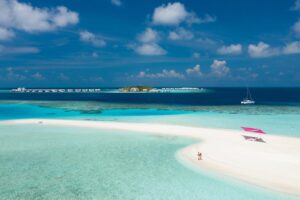Cruise liners have ceased operations in the Maldives due to increased costs resulting from the imposition of the Tourism Goods and Services Tax (TGST) on tourists. This change has significantly affected the operations of local agents who facilitate cruise line visits to the country.
According to regulations introduced under the previous administration, cruise tourists are required to pay TGST starting from their arrival date. Cruise operators are mandated to remit 16% of the total package price, including Maldivian destinations, as GST through local agents.
Mohamed Firaq, CEO of Inner Maldives and a representative for several cruise lines, explained that the Maldives has become a comparatively expensive destination. He provided an example to illustrate the disparity:
- A cruise liner carrying 1,500 passengers incurs approximately $80,000 in taxes to dock in the Maldives.
- In contrast, docking fees in Dubai are $28,000, while in Sri Lanka, they are $18,000.
“Cruise lines operate as businesses focused on minimizing costs. If the Maldives is significantly more expensive, operators will choose alternative destinations,” Firaq said.
In previous years, 20 to 30 cruise liners visited the Maldives annually, especially during the winter season. However, no arrivals are expected this year.
Firaq highlighted that neighboring countries, such as Sri Lanka and India, are reaping the benefits of this situation. Cruise liners are utilizing the port of Hambantota in Sri Lanka, while Cochin in India has seen increased activity.
The Maldives has also faced criticism for its high docking fees and inadequate services for cruise liners. Neighboring countries reportedly offer superior services at more competitive rates.
“This combination of high costs and subpar services has made the Maldives less appealing to cruise operators,” Firaq noted.
He attributed the issue to missteps in drafting TGST regulations. Initially, the intention was to exempt high-end yachts from TGST, but cruise liners were inadvertently included under the same rules.
Firaq stressed the urgency of amending these regulations before February 2025, as cruise itineraries for the following year are typically finalized by then.
“Taxation is not the issue, but it must be reasonable and aligned with the realities of the cruise industry and the competition from other destinations,” he concluded








